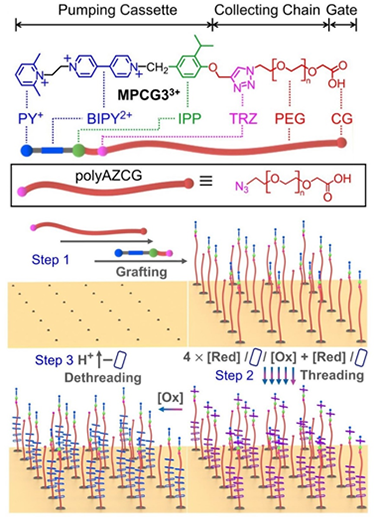A research article—published by our Foresight Fellows Liang Feng and Yunyan Qiu collaborating with the molecular-machine theorist R. Dean Astumian from the University of Maine—entitled “Active mechanisorption driven by pumping cassettes” has been featured in the latest issues of Nature Chemistry and Angewandte Chemie.
This article describes a story of how the team cracked the long-standing challenge of establishing an active mode of adsorption. The team discovered the phenomenon of mechanisorption, which results from non-equilibrium pumping to form mechanical bonds between the adsorbent and the adsorbate. Mechanisorption is associated with molecules that are transported actively to a surface compartment by using pumping cassettes and are retained in a highly non-equilibrium steady state indefinitely. Unlike physisorption or chemisorption which has governed chemists’ thinking for nearly one century, this work shows that, when coupled with an energy source, the passive movement of adsorbates from regions of high to low concentration is reversed, giving rise to active adsorption by which adsorbate concentrations are maintained with large differences in chemical potential on surfaces and in bulk solution. Now, in addition to physisorption and chemisorption, a new concept—namely mechanisorption—is about to enter the lexicon of chemistry. Further reading: C&EN, Phys.org, Chemistry World, Engineering 360, X-MOL, Northwestern Now, NU Chemistry Newsletters, UMaine News, Science and Technology Daily, Frontiers of Polymer Science.
The Nature Chemistry News & Views of this work, entitled “When push comes to shove” which was written by Dr. Liang Zhang, noted that: “Biological systems use chemical energy to achieve active transport in which systems are pushed into out-of-equilibrium states, and substrates are transported against the concentration gradient from regions of low to high concentration. Now, writing in Science, a team led by Fraser Stoddart and co-workers coin the term ‘mechanisorption’ to describe the active transport of adsorbates from solution onto the surface of a metal–organic framework (MOF) by using immobilized artificial molecular pumps.”
The Angew. Chem. Int. Ed. Hightlight of this work, entitled “A Molecular Pump Facilitates Mechanical Adsorption Away from Equilibrium” by Dr. Nadja A. Simeth, noted that: “Feng, Qiu, et al. have now crafted an artificial molecular pump (AMP) onto a metal-organic framework (MOF). This organized arrangement allowed the new system to fish molecules from the bulk solution and mechanically lock them at the surface. This form of adsorption is fundamentally different from classical physisorption and chemisorption, which are both possible in fully equilibrated systems. In sharp contrast, active mechanisorption results in a system away from equilibrium. … Eventually, this discovery could be a stepping-stone in the process of exploring novel fundamental phenomena such as mechanisorption, thereby paving the way to artificial molecular factories.”
Well done, Liang (Feng) and Yunyan! Thank you, Liang (Zhang) and Nadja, for the highlighting!



